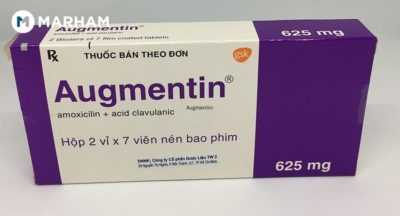About Augmentin:
Augmentin is available in various forms, including tablets, chewable tablets, and liquid suspension which is used to treat a variety of bacterial infections, such as respiratory tract infections, urinary tract infections, skin infections, and ear infections.
| Marketed By: | Glaxosmithkline |
| Drug Class: | Amino-Penicillin |
| Salt: | Amoxicillin 500mg, Clavulanic Acid 125mg |
Composition of Augmentin:
Augmentin is a combination antibiotic medication that contains two active ingredients:
- Amoxicillin
- Clavulanic acid
Available Strengths:
Augmentin is available in several different strengths, ranging from:
- 250 mg of amoxicillin and 125 mg of clavulanic acid per tablet.
- 875 mg of amoxicillin and 125 mg of clavulanic acid per tablet.
Augmentin tablets also contain other inactive ingredients, such as magnesium stearate, sodium starch glycolate, and microcrystalline cellulose.
What is the price of Augmentin in Pakistan?
Augmentin tablet (625mg) cost in Pakistan ranges between 550 PKR to 700 PKR per 6 tablets. The price range can vary depending on the manufacturer.
What is Augmentin used for?
Augmentin is commonly used to treat various bacterial infections, including:
- Respiratory tract infections, such as sinusitis, pneumonia, and bronchitis.
- Skin and soft tissue infections, such as cellulitis, impetigo, and abscesses.
- Urinary tract infections, such as cystitis and pyelonephritis.
- Ear infections, such as otitis media.
Mechanism of action of Augmentin:
The combination of amoxicillin and clavulanic acid in Augmentin creates a synergistic effect, with the clavulanic acid enhancing the activity of amoxicillin against beta-lactamase producing bacteria. This makes Augmentin effective against a broad range of bacterial infections, including those caused by beta-lactamase producing strains.
Pharmacokinetics of Augmentin:
- Augmentin is usually administered orally and is rapidly absorbed from the gastrointestinal tract.
- Augmentin has a broad distribution throughout the body, including the lungs, liver, kidneys, breast milk, and small amounts of it cross the placenta.
- Augmentin has a relatively short half-life of approximately 1-1.3 hours.
Caution: In patients with impaired renal function, the elimination of Augmentin may be slowed, and dosage adjustments may be necessary to prevent drug accumulation. In patients with hepatic impairment, the metabolism of clavulanic acid may be impaired.
Dosage of Augmentin (based on administration with food):
The following are general dosing guidelines for Augmentin based on body weight for oral administration with food:
- For children: The typical dose is 20-45 mg/kg/day of amoxicillin (chewable tablets), divided into two or three doses per day, for a maximum of 875 mg of amoxicillin and 125 mg of clavulanic acid per dose.
- For adults: The typical dose is 500-875 mg of the amoxicillin component, two to three times a day, for a maximum of 1750 mg of amoxicillin and 250 mg of clavulanic acid per day.
Consult a doctor for a right dosage of Augmentin!
Use of Augmentin in Pregnancy and lactation:
Augmentin is classified as a pregnancy category B medication by the US Food and Drug Administration (FDA), which means that it is generally considered safe for use during pregnancy when the benefits outweigh the risks.
Breastfeeding mothers who are taking Augmentin should monitor their infants for any signs of gastrointestinal upset, such as diarrhea or thrush.
Adverse effects of Augmentin:
Some of the common side effects of Augmentin include:
- Nausea
- Vomiting
- Diarrhea
- Abdominal pain
- Indigestion.
- Hives
- Itching
- Swelling of the face, lips, tongue or throat
- Difficulty breathing
- Anaphylaxis (a severe, life-threatening allergic reaction).
- Skin rash
- Candidiasis
- Liver dysfunction
- Fatigue
It is important to consult with a doctor immediately if any serious side effects occur while taking Augmentin.
Drug interaction of Augmentin:
Augmentin can interact with other medications, which can affect its effectiveness or increase the risk of side effects such as:
- Probenecid
- Methotrexate
- Warfarin
- Allopurinol
- Oral contraceptives
- Other antibiotics
- Vaccines
Storage of Augmentin:
- Augmentin should be stored at room temperature between 68°F to 77°F (20°C to 25°C).
- It should be kept in its original container, tightly closed, and away from light, moisture, and heat.
- Do not store Augmentin in the bathroom or any other location that may be prone to high humidity and temperature fluctuations.
- Before each use, the suspension should be shaken well to ensure uniformity.
FAQs:
1. Does Augmentin make you sleep?
In rare cases, Augmentin may cause more serious side effects that affect sleep, such as confusion, agitation, or hallucinations. These symptoms should be reported to a doctor immediately.
2. Does Augmentin cause constipation?
While constipation is not a common side effect of Augmentin, it is still possible for some patients to experience this symptom while taking the medication.
Disclaimer: The content published on Marham.pk is for informational or educational purposes only, produced from FDA-approved literature, and does not substitute professional medical advice. Please consult your healthcare provider before using a prescription or over-the-counter drug, or any other treatment option.

